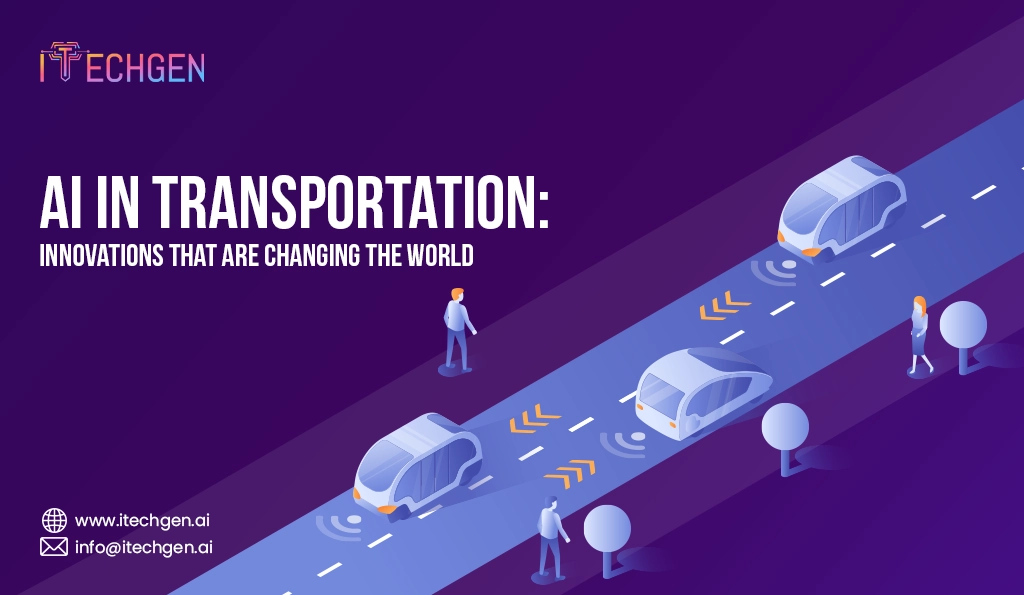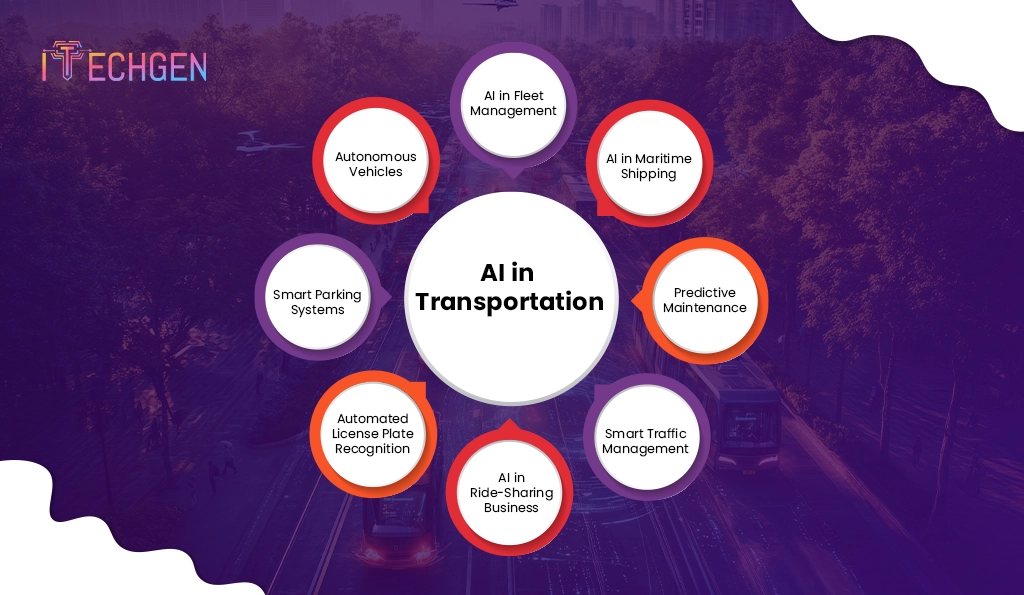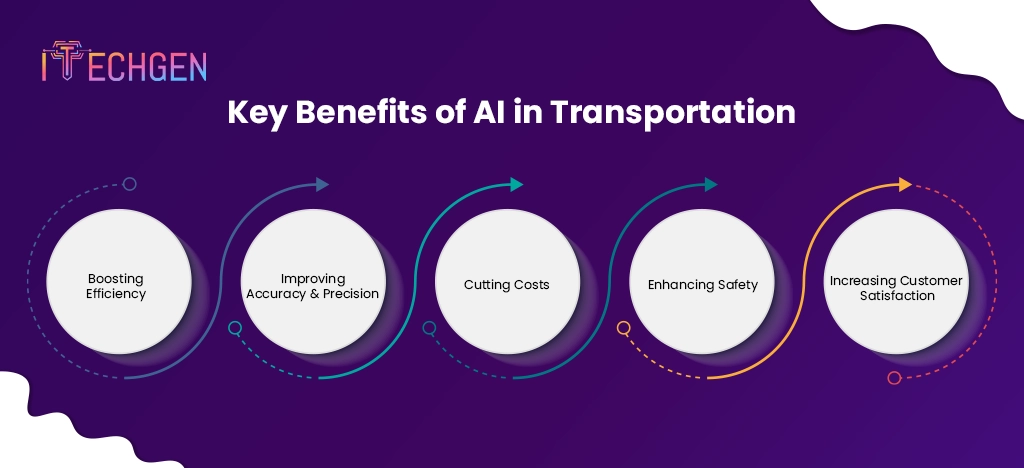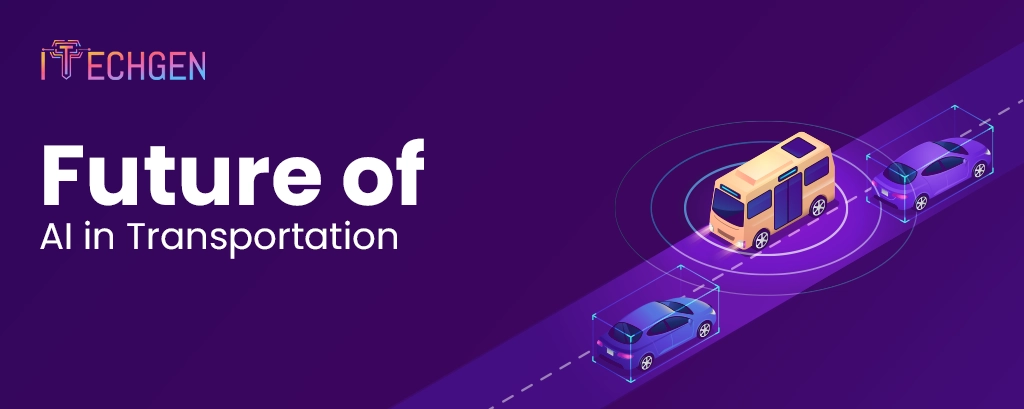
According to a 2019 survey, the average person in America spent over 54 extra hours annually in traffic delays. By “extra hours,” it means the additional time stuck in traffic due to congested speed. Another research, conducted in 2023, revealed that the emission of harmful CO2 reached over 8 billion (Yes, billion with a B!) metric tons, accounting for 21% of the world’s total CO2 release. These whopping figures are way more than statistics—they scream a pressing concern for innovation. This is where AI in transportation can help.
If you start wondering about the transportation industry, you may find a lot is going on behind the scenes. Various external factors, including human errors, human behaviors, accidents, economic downfalls, and even time of the day affect this industry. Artificial intelligence uses this data to predict the probability of diverse scenarios. In fact, the involvement of AI in transportation is estimated to be valued at US$ 6.51 billion by 2031. This represents a CAGR of over 17% from 2024 to 2031.
In this blog, we’ll explore various possibilities that artificial intelligence can bring to the transportation sector. Let’s highlight AI’s use cases, applications, and benefits while exploring the future of AI in transportation.
Over the past decade, artificial intelligence has brought revolutionization in several industries, and transportation is riding the wave too. From autonomous cars to optimizing traffic management and fleet systems, AI in transportation provides greater efficiency and sustainability to the transport industry. Let’s explore these innovations in detail.

Artificial intelligence in automotive has gained a lot of traction over the years. This technology allows vehicles to move freely without human intervention. It leverages sensors and machine learning technology to determine the environment surrounding the vehicles and make decisions instantly. Autonomous vehicles can significantly reduce road accidents and human errors.
Autonomous cars have already been tested, and are proven to be tremendously great at analyzing road obstacles and improving navigation. Since AI can process and forecast an abundance of data in one go, it helps commuters in unforeseen situations like bad weather or traffic patterns.
As AI in transportation continues to evolve, it can be said that this technology will make a significant mark in the coming years by offering opportunities for both commuters and companies.
There is no if or but that artificial intelligence has many positive results for fleet management companies. It boosts workflow efficiency and minimizes operational costs. How? Through AI, engineers and drivers can easily monitor their vehicles’ health, predict maintenance schedules, and optimize routes based on real-time data. All these features can greatly prevent breakdowns or service disruptions, contributing to overall productivity.
With AI, fleet managers no longer have to rely on the human workforce for scheduling maintenance or analyzing the fleet’s health. Once you integrate AI into fleet management, it will automatically keep track of all these things, resulting in optimal performance and reducing the need for unwanted repairs.
Moreover, artificial intelligence can also help enhance fuel efficiency, streamline your logistics, and improve your drivers’ safety. This can result in cost-cutting, safer journeys, and seamless fleet operations.
Even the shipping sector has seen immense developments with AI in transportation. In maritime shipping, operations like proper navigation, port management, tracking abnormalities, and safety play an important role. These all operations can be effortlessly optimized with the help of AI, big data, and IoT.
For instance, with the help of AI-powered automatic identification systems (AIS), vessels and ports can send and receive critical ship data like identification numbers, locations, speeds, etc., in real-time. This significantly impacts the efficiency of shipping operations. Moreover, with AI-powered tools, mariners can optimize fuel usage and handle route planning, ensuring effective, budget-friendly operations worldwide.
As we already know, artificial intelligence can monitor your vehicle’s health and predict issues by analyzing sensors’ data to check for wear and tear. This helps fleet operators avoid unnecessary breakdowns/downtime, minimize operational costs, and improve fleet life. With this knowledge, you can timely schedule your vehicle’s repair and maintenance and optimize its overall performance.
Apart from predicting maintenance for automobiles, AI can analyze various other things, including roads, bridges, traffic, weather, etc., further enhancing the safety and reliability of your fleet.
AI has the potential to analyze real-time data using predictive analytics. Based on the data, it helps adjust traffic signals, suggest alternative routes, and minimize delays. These optimizations help streamline traffic flows, reduce congestion, and lower road accidents.
Moreover, with AI technology, drivers can get real-time updates on traffic patterns, fuel consumption, and harmful emissions. This will greatly reduce the impact of detriment carbon monoxide in urban transportation networks.
Optimizing routes for both drivers and passengers, predicting passenger behaviors, and enhancing fleet management systems are some of the boons that artificial intelligence has given to ride-sharing businesses. This technology leverages machine learning algorithms to analyze traffic, user preferences, and vehicle availability, and accordingly show passengers the best options available.
Big-shots like Uber, OLA, and Lyft have already implemented AI in their ride-sharing businesses so that riders get their ideal drivers nearby, leading to improved customer satisfaction. In addition, this technology can also predict high-demand areas, allowing for better fleet distribution and reduced idle times.
ALPR is one of the best examples of the revolution of AI in transportation. This technology allows automatic detection and tracking of vehicle license plates. ALPR leverages machine learning and scanning devices like cameras to read license plates. Mostly, these kinds of AI-powered systems are used for toll collection, parking tickets, traffic management, and more.
Additionally, automated license plate recognition plays a pivotal role in capturing traffic criminals. It helps identify vehicles charged with traffic rule violations or involved in criminal activities through number plate scanning.
By automating tasks like parking enforcement and traffic monitoring, ALPR minimizes the need for manual intervention, ensuring faster, more accurate results.
AI’s smart parking system allows drivers to get rid of the struggle of finding empty parking lots for their vehicles. These systems are equipped with specialized cameras and sensors to find empty parking spaces and deliver instant updates to vehicle owners within a few clicks on a smartphone app.
AI integration in facilities like malls, hospitals, hotels, colleges, etc. can maximize the efficiency of the existing parking lots. Owners no longer have to deal with aimless drivers who can cause traffic jams or congestion within the premises.
Moreover, these smart parking systems can predict when the spaces will become available, allowing for easier access. This not only enhances the driving experience but also reduces harmful emissions caused by vehicles idling while finding a parking place.
After understanding the important use cases and applications of AI in transportation, let’s discuss some of its intriguing benefits:

Artificial intelligence has the potential to simplify intricate processes. Better route planning, predicting/scheduling maintenance needs, and automating recurring tasks, help transportation and logistics companies get things done faster and hassle-free.
With AI crunching the numbers and analyzing data, there’s less room for human error. From keeping track of inventory to planning delivery routes, AI ensures everything runs more smoothly and accurately, leaving customers happier and businesses more reliable.
AI helps cut costs by reducing wasted energy, saving time, and automating manual tasks. It ensures that resources flow more efficiently, so companies can focus on being economical while staying ahead of the competition.
AI-powered systems in autonomous vehicles and self-driving cars have tremendously helped reduce accidents by delivering real-time alerts and analyzing risks much better than humans. This makes roads safer and ensures companies can plan ahead to avoid potential problems.
AI makes life easier for customers by providing accurate updates, faster deliveries, and personalized services. Whether it’s a smooth delivery experience or knowing exactly when a package will arrive, AI helps keep customers satisfied and coming back for more.

Artificial intelligence has paved the way for a safer, smarter, and more efficient transportation experience. From aviation to railways, AI is transforming how consumers move from one place to another, revolutionizing the future of mobility.
The integration of AI in transportation offers groundbreaking solutions to ease traffic congestion, improve traffic management, and provide a seamless parking experience. These technologies reduce vehicle fuel consumption and improve urban planning and air quality, creating more sustainable cities.
With developments in autonomous vehicles and AI-powered predictive analytics for infrastructure planning, the road ahead is filled with opportunities for innovation. AI promises to touch every aspect of the transportation industry to drive more improvement.
As the transportation industry relies more on artificial intelligence and machine learning, the benefits will extend beyond financial gains. It will make future systems smarter, greener, and more efficient. AI-powered applications are set to lead the way in shaping the next generation of transportation.
Artificial intelligence will be deep-rooted in diverse industries in ways we couldn’t have pictured. The adoption of AI in transportation comes with plenty of benefits, including fleet management, reduction in fuel consumption, weather prediction, and the list is never-ending.
From optimizing traffic flow and boosting safety to managing autonomous and EV cars, AI is changing the future as we move ahead. Despite being a complex and expensive technology, AI offers solutions that help in the long run.
Do you have an AI-powered project in mind that you want to implement? Partner with iTechGen and leverage our AI development services to take your project to new heights. We have the right expertise and you have the idea. Let’s build something extraordinary together. Reach out to our sales team today.

Pankaj Arora is the Founder & CEO of iTechGen, a visionary leader with a deep passion for AI and technology. With extensive industry experience, he shares expert insights through his blogs, helping businesses harness the power of AI to drive innovation and success. Committed to delivering customer-first solutions, Pankaj emphasizes quality and real-world impact in all his endeavors. When not leading iTechGen, he explores emerging technologies and inspires others with his thought leadership. Follow his blogs for actionable strategies to accelerate your digital transformation and business growth.
View More About Pankaj Arora